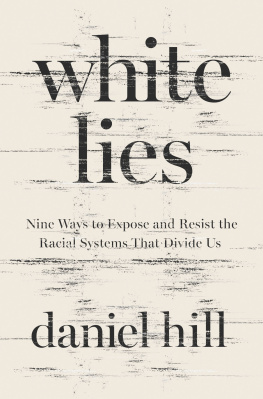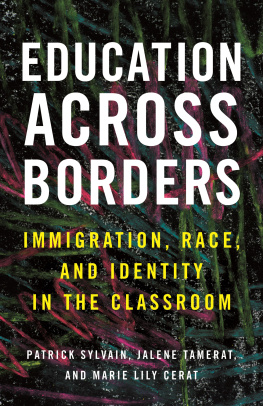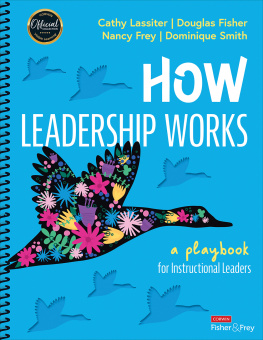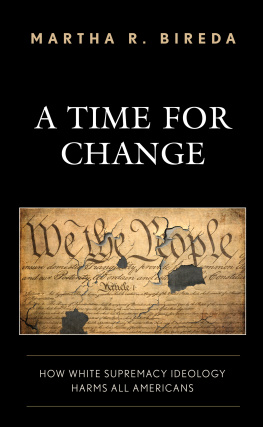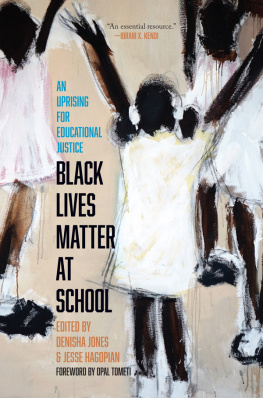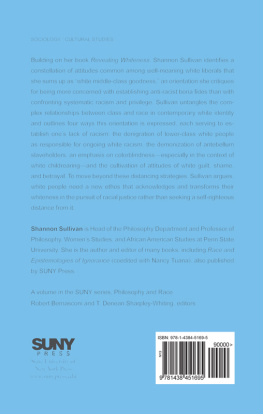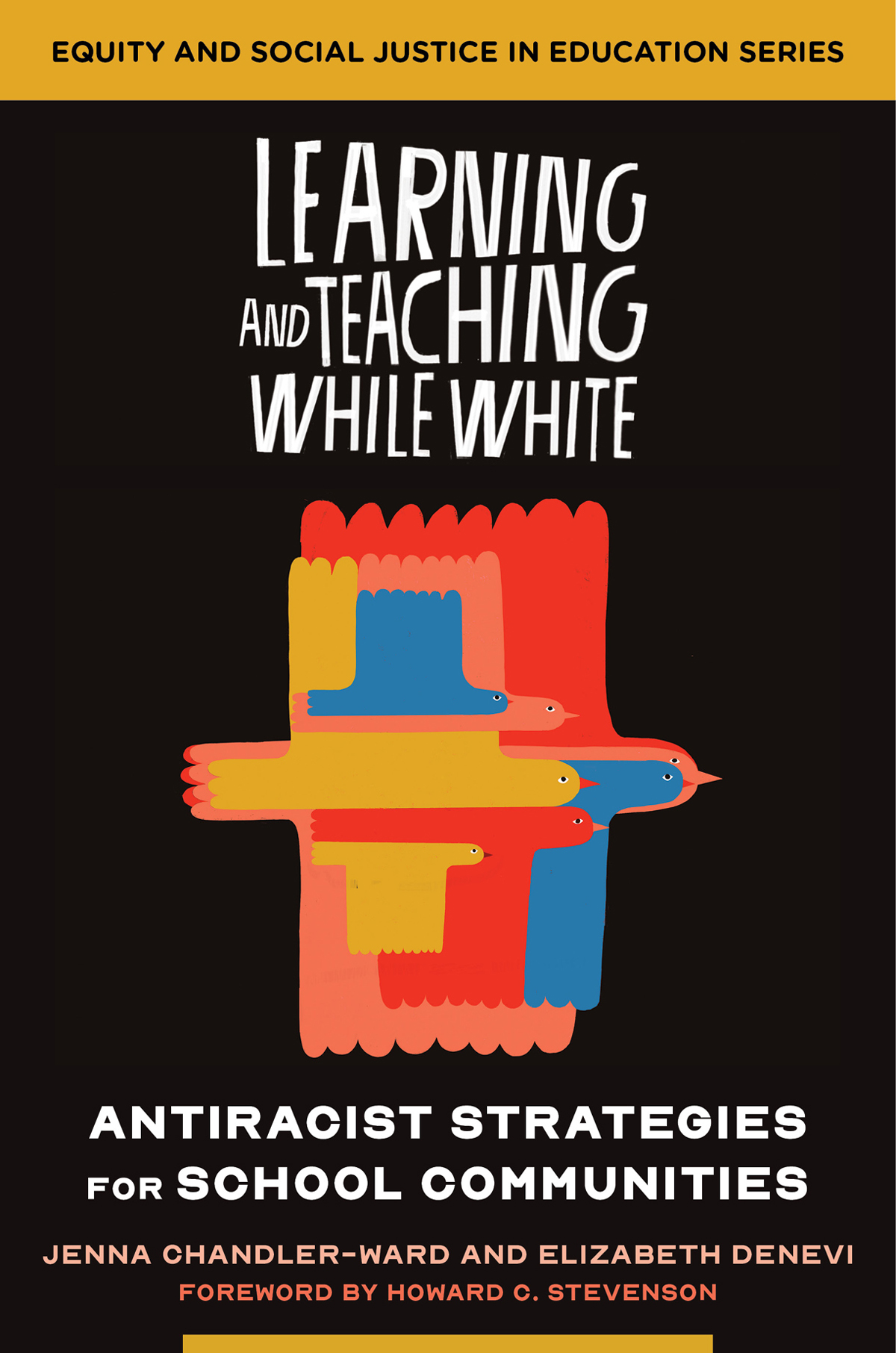Contents
Guide
Page List
Norton Series on Equity and Social Justice in Education
Cheryl E. Matias and Paul C. Gorski, series editors
Nortons Equity and Social Justice in Education series is a publishing home for books that apply critical and transformative equity and social justice theories to the work of on-the-ground educators. Books in the series describe meaningful solutions to the racism, white supremacy, economic injustice, sexism, heterosexism, transphobia, ableism, neoliberalism, and other oppressive conditions that pervade schools and school districts.
Learning and Teaching While White
Jenna Chandler-Ward and Elizabeth Denevi
Ableism in Education
Gillian Parekh
Public School Equity
Manya C. Whitaker
Social Studies for a Better World
Noreen Naseem Rodrguez and Katy Swalwell
Equity-Centered Trauma-Informed Education
Alex Shevrin Venet
NORTON BOOKS IN EDUCATION
LEARNING AND TEACHING WHILE WHITE

ANTIRACIST STRATEGIES FOR SCHOOL COMMUNITIES
JENNA CHANDLER-WARD AND ELIZABETH DENEVI
FOREWORD BY HOWARD C. STEVENSON

To our students: thank you for all you have taught us.
CONTENTS
by Howard C. Stevenson
Have you ever had a social injustice situation that called for you to speak up, one that Martin Luther King might describe as your drum major for justice moment? But you found yourself so overwhelmed that instead of speaking up, you tripped up and fell? If youve had this moment, did you question your resolve or courage? Did you doubt if you might ever link your social justice talk with your behavior and be that drum major? In this book, Jenna Chandler-Ward and Elizabeth Denevi have an answer for these and other powerful questions. The call for clarity on how race and racism matter in our society has been loud in these first two decades of the twenty-first centuryalmost as loud as the attempts to block the teaching of the history of racism in public and private schooling. Whether we consider how race matters in our schools or in our courtrooms, or in the public thoroughfares that we traverse daily, the politics and hostilities of race and racism have become stark. In their book, Jenna Chandler-Ward and Elizabeth Denevi teach us to stop and look at how these politics are undermining the very basic goals of education: curiosity, learning, and depth of knowledge. The authors help us understand that while these racial politics are not new, they disrupt childrens depth of knowledge of the worlds past and present, and that could undermine the future.
Chandler-Ward and Denevi argue that without clarity on this countrys love affair with racial hierarchy, as well as its potential for racial change, we wont be able to provide a just education for any child, regardless of their race. They issue a plea to understand that the fight for social justice in education is about humanity, forgiveness, and accountability. They call out white people, educators, and justice warriors to pay attention, take notes, and become honest advocates against these efforts by adopting antiracist coping strategies in thought, word, and deed. Not an easy task, but not impossible either. Given the resistance against honesty about racism, they focus on teaching. They focus on the thorny dilemmas that educators must face daily with students of color, who cry out often that what they are learning is unfair to them.So how does a teacher manage when their own students are calling them out to change the racism in their classroom? Chandler-Ward and Denevi interrogate and illuminate what these racial politics mean for white people and specifically for white teachers. The work of this book is not simply about the rationales behind the systemic nature of racism in education, but the cognitive dissonance that white teachers struggle daily to deny, admit, and ameliorate in the classroom. These racial politics are proximal. The importance of this clarity is no small matter, as racial tensions rise and as legislation to eradicate discussions about race and white privilege from K12 education rages on across the country. These policies filter down to the classroom, to the relationships, and to the children. What Chandler-Ward and Denevi want to do is to prepare educators for those racially stressful moments.
Beyond clarity, the authors advocate for courage. They want white people to come to a reckoning. This reckoning involves trying to engagenot avoidingthe obvious tensions, factions, and examples of racial dishonesty, avoidance, denial, and privilege.
Chandler-Ward and Denevi start by acknowledging the burden that People of Color have endured by bearing their souls in the service of teaching the world about racial dehumanization, without a meaningful humane response. They acknowledge that if change is going to happen, white people must hold themselves accountable, develop the courage to be challenged, and scale up their competencies to be able to safely navigate racially stressful encounters. That said, they dont recommend or advocate for change without strategy, compassion, or instruction.
Many racial journeys in our countrys history have called for conversation between racial groups to come to consensus and reach common goals. While this remains the hallmark of racial progress in this countrys legacy, Chandler-Ward and Denevi are suggesting we need more than talk. Socially-just education requires actions louder than words for every classroom, every child, every day.
The authors dont hide the challenges for the audience of white educators to face the truth of their role in racial dehumanization, but they also dont dehumanize educators. What I find refreshing in this work is that Chandler-Ward and Denevi provide roadmaps, definitions, self-reflections, and years of classroom and school experiences to help the reader struggle and rise from that struggle. They provide lampposts when the journey toward social justice gets dark. By being both brutally honest, confessional, and self-reflective about their thoughts and feelings during their difficult moments, the reader can project their fears and identify with strategies to meet those fears head on. To give direct and supportive feedback about the detriment of ones blindness to the awful power of white supremacy (whether the S is little or big) in ones teaching of children is a gift. But, to demonstrate steps to hold oneself accountable for that power and that blindness while recognizing redemptive potential in each of us is as humane an expectation as we have in the proximal war against racism. Chandler-Ward and Denevi provide this honesty, accountability, and hope by defining the confusing terms, conditions, and history of how racism embraces the cloak of whiteness and shows up in classroom lessons. They help teachers realize that without attention to antiracism approaches, they will find their current practices far removed from the earlier reasons of social justice that, dare I say, drove them into this much-maligned profession. The stories, practical guidance, and classroom exercises offer so many opportunities for teachers to grow and be agentic, instead of passive, when a social injustice shows up. I look forward to the excitement of building a corps of white teachers who are unafraid to speak truth to power against forces that would rather bury their racial heads into the ground. If you read this book, I suggest you not only ready yourself to be emotionally challenged, even overwhelmed. But if you apply the strategies here as thoroughly as if someones life depended on it, instead of making excuses, be prepared to engage your next drum major for justice trial with much more courage. I doubt you will find your actions inert the next time around.


